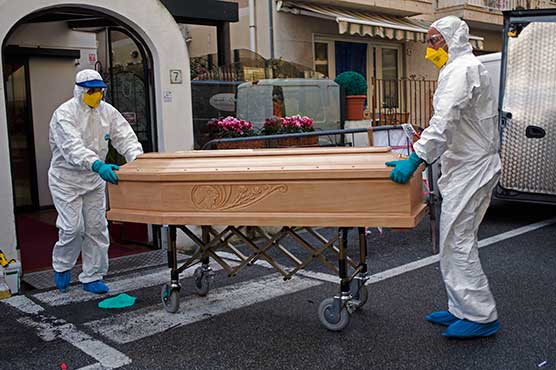Global coronavirus death toll tops 50,000

The US and Canada have 235,900 cases and 5,427 deaths and Asia has 112,061 cases with 3,998 deaths.
PARIS (AFP) - The coronavirus pandemic has killed more than 50,000 people worldwide with nearly three-quarters of the deaths in Europe, according to an AFP tally at 1750 GMT Thursday using official figures.
A total of 51,364 deaths have been recorded across the world, including 37,709 in Europe, with Italy registering 13,915, followed by Spain with 10,003, France with 5,387 and the United States with 5,316.
Since the virus emerged in China in December, 989,281 global infections have been confirmed, more than half of them in Europe, which has 542,077.
The United States and Canada have 235,900 cases and 5,427 deaths and Asia has 112,061 cases with 3,998 deaths.
NATO military chief to boost fight against virus
NATO put its top military commander in charge of boosting the alliance s fight against the "invisible enemy" of coronavirus. Foreign ministers tasked allied commander US General Tod Wolters with improving coordination among the 30 allies so that medical supplies can be delivered quickly to countries in need.
Flights carrying equipment to help in the fight against the pandemic will now also use a NATO call sign, giving them priority in European airspace.
"Today we decided to direct our top commander, General Wolters, to coordinate the necessary military support to combat the crisis, to speed up and step up assistance," NATO Secretary General Jens Stoltenberg said after the ministers held talks by video link for the first time in the alliance s 70-year history.
"For instance, by identifying the airlift capacity to ensure that medical supplies are delivered, coordinating on any surplus capacity or stocks and better matching requests for support with offers from Allies and partners."
NATO defence ministers will hold a video meeting in around two weeks time to review the situation, with Wolters to brief them on his work.
British Foreign Minister Dominic Raab said the allies were determined to beat the "invisible enemy" of COVID-19.
While NATO does not have medical equipment of its own to deploy, it is acting as a forum for allies to exchange requests for help, as well as aiding in the transport of supplies.
Several member countries have used airlift schemes overseen by NATO to transport masks, protective suits and other equipment between themselves and also from Asia.
Military planes have also been used to transport patients from Italy -- the worst affected country in Europe -- to Germany.
"NATO is not the emergency physician in a health crisis, but it has well-established mechanisms that can be of use to us," German Foreign Minister Heiko Maas said after the talks.
"These include the procedures for responding quickly to disasters or the know-how to procure urgently needed materials."
While Italy and Spain have borne the brunt of the virus in Europe so far, other countries are at different stages of the pandemic.
NATO hopes to use this staggered development of the pandemic to distribute medical resources around the alliance as needed.
"The effects of the crisis will not be stable -- won t be the same for all allies at all times," Stoltenberg said.
"So not all allies will see the peak of the pandemic at the same time, and this makes it possible to reallocate some resources."

